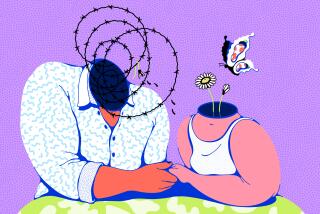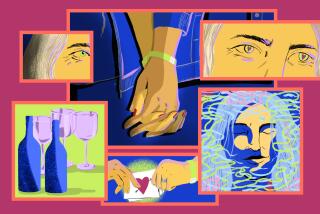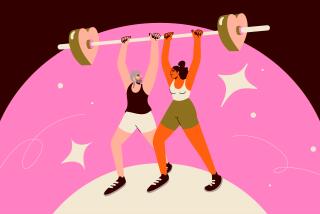What Mr. Right doesn’t read
The books come wrapped in jackets of purple and pastel pink, their titles urgent and peppered with numbers and exclamation points of the “Six Ways to Know if He’s the One!” variety.
They take up substantial real estate in the self-help aisle, these tomes of dating and mating rules and lists, dispensing how-to prescriptions for every stage of the relationship cycle.
How to meet a guy. Tell if he’s into you. Know if he wants to marry you.
How to spice up your marriage. Get your husband to share his feelings. Get him to scoop his dirty underwear off the floor. (Good luck.)
How to know when it’s over. Tell him it’s over. Get over it when it’s over. How to pick yourself up, dust yourself off.
How to meet a guy.
Call it valuable counsel for the lovelorn. Call it paper-thin wisdom that capitalizes on their deepest insecurities. But there is an unmistakably strong market for these books. And they’re overwhelmingly written for and purchased by women.
Industry watchers say they’ve seen a swell in this genre, propelled in part by the success of last year’s “He’s Just Not That Into You” -- the sassy cult favorite inspired by an episode of “Sex and the City” that implores women to stop making excuses for wishy-washy men and raise the bar for what they’ll accept from the opposite sex.
“I’ve gotten a slew of books in the last couple of months,” says Sarah Gold, senior reviews editor at Publishers Weekly. “They’re definitely geared more toward women. I don’t think any of the ones I got were specifically geared toward men.”
But if it indeed takes two to tango, if on a very basic level men and women are seeking the same thing -- each other -- why are women so much more keen to study the ins and outs of dating and relationships? Where are the advice books for men? Why aren’t books being written for men?
“I saw the guy who wrote [“He’s Just Not That Into You”] on TV, and the interviewer asked him the same question,” says Colin Mulready, 28, easing back at a corner table with some friends at the Wood-n-Tap in Hartford, Conn. “He said, ‘Because I want to sell more than two books.’ ”
That’s not far off.
According to Barnes & Noble, 80% of customers who bought books on relationships are women. Relationship books for women outsell those for men by a ratio of 4 to 1, the company reports.
“It’s always a strong market. It seems there’s a constantly replenishing audience for it. Depending on what stage they’re at in their life, they’re going back to that self-help shelf and looking for what’s the newest answer, what’s the latest theory,” says Gary Krebs, executive publishing director of Adams Media. “Sometimes [women] may not actually know what they’re seeking. There’s a sense of things not feeling quite right ... a general unhappiness, and they want to figure out why that unhappiness exists and how to solve the problem.”
Adams seems to have found a cushy niche in this category. Among its popular selections: “The List: 7 Ways to Tell if He’s Going to Marry You -- in 30 Days or Less!” The publishing company has yet to print a guide for men. And it’s not likely.
“We’ve basically drawn the conclusion that there isn’t much of a point to it,” Krebs says. “That doesn’t mean men don’t need books in that category, because I’m sure they do. But ... I just don’t think it would work.”
Oh, but there are relationship books on the shelves for the gents. A cursory search through online booksellers yields the following gem: “Make Every Girl Want You: How to Have Sex With Hot Girls (Without Even Dating Them!)”
“It’s not that men don’t read. It’s that they’re not reading what’s not interesting to them. These books have to use the language they use. You wouldn’t write in Japanese to someone who speaks Spanish,” says relationship author Jaci Rae.
Not that she agrees with the messages in those titles. Her book “Winning Points With the Woman in Your Life One Touchdown at a Time” marries relationship advice with football lingo to explain to men the mysteries of women and the ways of a healthy relationship.
“Men are supposed to be strong. They don’t need to have all these emotions involved in what they do,” Rae says. “And most books that deal with relationships deal with emotions. So men have no need for them.”
Authors and publishers cite a host of reasons as to why women snap up these guides in greater numbers.
For better or worse, generalization or not, women are more inclined to chat out their feelings, analyze every delicate detail of what makes relationships go wrong and go right.
“It’s the sewing circle. There’s this cultural thing. Women talk and they share.... That’s just what we do,” said Alison Lawrence, co-author of “BitterGirl: Getting Over Getting Dumped” -- a breakup survival guide based on a play by the same name. “For guys it’s more: Suffer in silence, stiff upper lip, and you just get on with it,” she says.
Lawrence illustrated the disparity this way: A while back two friends were in the midst of a breakup. The females in this circle of friends got together over a bottle of wine to laugh, cry and talk it through.
The men? They shared a bottle of scotch, watched the game and hit a bucket of balls. They never uttered a word about the breakup.
If women collect these books because they’re prone to seeking guidance, authors say, men shun them because they’re notoriously disinclined to ask for direction -- whether on the road or in a relationship.
Back around the corner table at the Wood-n-Tap, Justin Gatti, 28, says he agrees with this thesis. When it comes to advice on women, he doesn’t consult books or online advice columns. He may consult close friends.
But mostly, “I just go from my own experiences. I live and learn through my own [screw-ups],” Gatti says over the din of booze-addled twentysomethings chatting and flirting.
Outside of that, men might pause on a magazine blurb about dating. They don’t seek it out. It’s more like picking up a magazine in which, in one swift read, they can learn how to pump up their pecs and pleasure a woman. “Guys just have a shorter attention span,” Gatti says between sips of beer.
Women, he asserts, get more invested in relationships, are intent to fix what’s broken instead of letting go what may simply be damaged goods. “Guys are more ‘the grass is greener,’ ” he says, explaining that if a relationship isn’t working, men will leave it behind for a better one.
“Girls seem like they’d rather stick out the relationship and try to make the brown grass greener.”
Hunkered down bar-side at Vaughan’s Public House in Hartford, Chip Grannis winces at the question of dating books.
“It’s scary, because they sell,” said Grannis, 26, a local bartender and bar manager. He said women should ease up, not take the dating scene so seriously. It’s just dating -- a guy and a girl trying to get to know each other.
Would he ever read a dating guide himself? He rolled his eyes.
“Why would I go to a stranger and follow their advice as law?” he asks, waiting a beat before quipping: “I can make a jackass of myself just fine on my own.”
More to Read
Sign up for our Book Club newsletter
Get the latest news, events and more from the Los Angeles Times Book Club, and help us get L.A. reading and talking.
You may occasionally receive promotional content from the Los Angeles Times.







